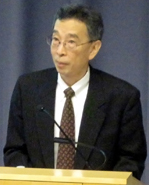
The Twelfth Annual John W. Hall Lecture in Japanese Studies was delivered on October 27 by Hiroshi Ishida, Professor of Sociology at the Institute of Social Sciences, The University of Tokyo. Ishida is a leading expert on social inequality in Japan. The public lecture and reception were sponsored by the Council on East Asian Studies at Yale University. Ishida’s lecture “Social Inequality among Japanese Youth: Education, Work, and Marriage in Contemporary Japan” provided important perspectives on the school-to-work transition of high school graduates and the transition to marriage.
Contemporary Japanese society is going through a transitional phase in terms of economic downturn, disintegration of the lifetime employment system, declining birth and marriage rates, and an increase in women entering full-time employment positions, among others. This changing environment exacerbates problems of social stratification as it is reflected in the transitions from school-to-work and marriage. Common features of school-mediated transition among high school students include government-regulated schedules; students must be recommended by a school and can only apply to one company at a time; schools select which students can apply to companies; and there is a long-term relationship between employers and schools. Ishida argued that the professional-managerial class relies less on school mediation to find jobs than children from the non-skilled, manual labor class. With regard to the transition to marriage, the active search for a partner is not related to the intensity of such search, but rather, it is related to class. The lecture and lively Q&A session with the audience concluded that the school-to-work transition does not reflect any evidence of decline in the use of school-mediated systems. Examination of the transition to marriage revealed that there are substantial differences in the chances of actively engaging in a partner search and getting married, as they are closely related to one’s home environment and socioeconomic status.
Professor Ishida’s research interests also include comparative social stratification and health inequality. He is the author of Social Mobility in Contemporary Japan and the co-author of Schools, Public Employment Offices, and the Labor Market in Postwar Japan.
The John W. Hall Lecture Series in Japanese Studies was established with generous support from Mrs. Robin Hall in memory of her husband. Considered one of this past century’s finest scholars of the history of Japan, John Whitney Hall was born in Tokyo in 1916 and developed an interest in Japanese language, culture, and history at an early age. After receiving his PhD in East Asian Languages and Literatures at Harvard, Hall began his academic career at the University of Michigan in 1949 and came to Yale in 1961 as A. Whitney Griswold Professor of History, a position he held until his retirement in 1983. Professor Hall specialized in the Ashikaga through Late Tokugawa periods, and throughout his career, he wrote or edited some of the most important and influential volumes on Japanese history. He contributed to the study of Japan not only through his writing, but also through service as chair of several local and national committees, including the Japan-U.S. Friendship Commission, the Association for Asian Studies, and the American Council of Learned Societies-Social Science Research Council Joint Committee on Japanese Studies. The Council on East Asian Studies is pleased to present this important annual lecture to enable young and old scholars alike to remember John W. Hall’s work and contributions to the study of Japan.
